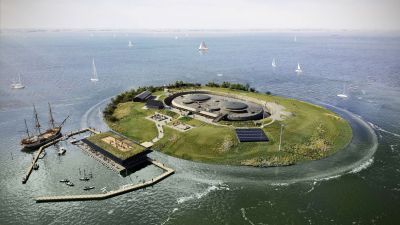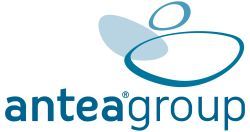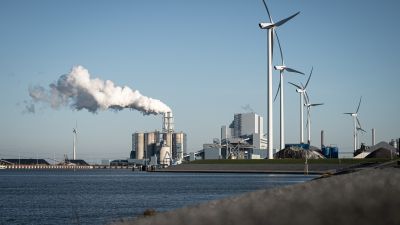
Pampus Island Climate-Neutral Transformation
"Turn a historic fortress island into a self-sufficient and climate-neutral island." Sounds like an impossible task. The fort wants to become the first piece of world heritage with a circular energy system, it is transforming - with the help of Antea Group Netherlands - into a fortress of the future. This UNESCO World Heritage Site aims to be an inspiring starting point for the energy transition: "If it works here, it works everywhere in the Netherlands."
"It would have been easier to run a cable to shore. But we wanted to transform into a sustainable energy system, using circular principles. To do justice to history and to be a starting point for change: a example for the rest of the country."
Challenges included:
- Making a UNESCO World Heritage site completely energy neutral
- Working within a protected nature area
- No power connection or backup to mainland
"You won't make it with sun or wind alone. That's why we made a mix: sun, wind and bio-fermentation." Energy storage also had to be considered. During the high season the energy demand is higher than in winter. You have to buffer to balance. That solution was found in a lithium battery, biogas storage and a cogeneration and hydrogen installation. A smart grid system determines how energy is buffered and which energy source is used.
Solutions included:
- A new sustainable energy system that includes thermal, solar and wind energy and an innovative biodigester.
- A system that is also able to buffer energy using hydrogen and manage it smartly via microgrid control for year round energy supply.
- A new water purification plant with which Fort Island can, just like in the past, produce its own drinking water.
- Understanding the effect of wind turbines on the ecology with a team of experts.
Key figures, after solutions were implemented:
- 125 kW power installation
- 10 m3 water purification per day
Benefits:
- A new circular entrance building with integrated facilities.
- A new sustainable energy system that includes solar and wind energy and an innovative biodigester.
- A system that is also able to buffer energy using hydrogen and manage it smartly via microgrid control.
- A new water purification plant with which Fort Island can, just like in the past, produce its own drinking water.
- The sustainability or redevelopment of the other historic buildings.
- A sustainable fleet.
- An educational program to inspire and encourage the soon to be 100,000 visitors per year - of which 10,000 are students - to make their own behavior more sustainable.
Photo credit: Pixelpool
Associates
"From ecologists, construction engineers, planners to specialists in the field of permits and energy: there is a colleague involved in Pampus from every corner. This shows the strength of a multi-disciplinary consultancy firm. By bundling different specialisms, we are able to take these types of projects further."
Amsterdam Island Stichting Forteiland Pampus

